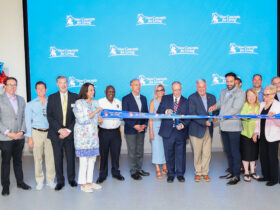The New Jersey Board of Public Utilities has granted $1.4 million to NJ TRANSIT that will expand the company’s non-revenue gas-powered vehicles and offer backing for the required charging infrastructure. NJ TRANSIT had assured a quarter of the $5.7 million available in the NJBPU’s Clean Fleet EV Incentive program, which is a portion of a larger grant that involves three of the NJBPU’s other electric vehicle charging infrastructure programs like the Multi-Unit Dwelling (MUD) EV Charger Incentive Program and Electric Vehicle Tourism Program.

The Clean Fleet EV Incentive Program is a program that supports local and state governments from gas-powered vehicles to electric vehicles. Entities that are eligible for the program include state commissions and universities, community colleges, municipalities, and more.
More information on the New Jersey Board of Public Utilities programs and who is eligible for them can be found HERE.
“NJ TRANSIT is pleased to receive this important funding from the NJBPU”, said Diane Gutierrez Scaccetti, New Jersey Department of Transportation Commissioner and NJ Transit Board Chairwoman. “The financial support will allow us to expand our fleet of non-revenue electric vehicles, improve efficiency with our charging stations, and continue to ease our carbon footprint through reduced emissions in the communities we serve”.
“We are grateful to the New Jersey Board of Public Utilities for this $1.4 million grant, which is fully aligned with NJ TRANSIT’s steadfast commitment to sustainability”, said Kevin S. Corbett, NJ TRANSIT President and CEO. “These funds will support our efforts to continue advancing the electrification of our non-revenue fleet, as well as New Jersey’s broader sustainability goals”.
“As we strive to combat the increasingly devastating impacts of climate change, it is essential that we support agencies that are reducing their carbon footprint”, said Christine Guhl-Sadovy, the President of the NJ Board of Public Utilities. “I commend NJ TRANSIT for their commitment to a cleaner NJ by electrifying their non-revenue fleet and investing in charging infrastructure, reducing emissions particularly in the communities they serve”.
The grant will be used to further progress the electrification of the company’s corporate vehicles including obtaining supplementary Battery Electric Vehicles (BEVs), Level 2 (L2) Fleet Chargers – which can charge a BEV from empty to 80 percent in 4-10 hours – and Direct Current Fast Charging Equipment Units (DCFCs), which provide quick and
In about 20 minutes to an hour, DCFCs can charge a BEV to 80 percent. NJ TRANSIT is building the company’s first DCFC charger at the Newton Ave. site in Camden.
About NJ TRANSIT
NJ TRANSIT is the nation’s largest statewide public transportation system providing more than 925,000 weekday trips on 253 bus routes, three light rail lines, 12 commuter rail lines and through Access Link paratransit service. It is the third largest transit system in the country with 166 rail stations, 62 light rail stations and more than 19,000 bus stops linking major points in New Jersey, New York, and Philadelphia.














